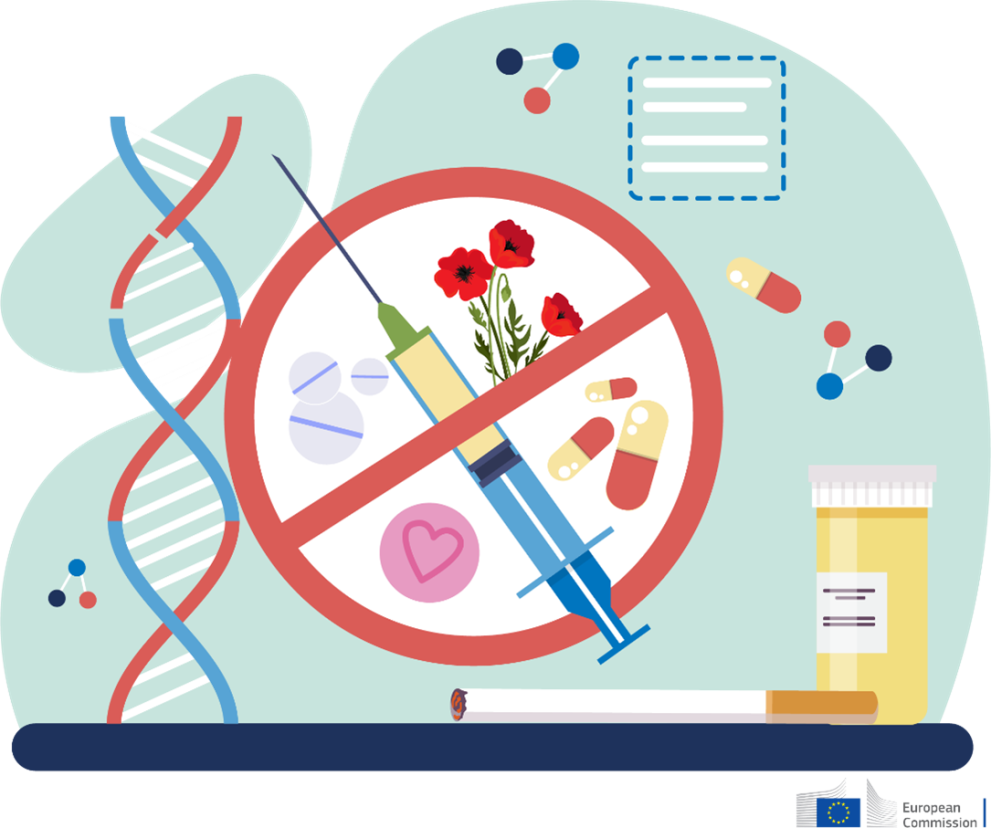
Illicit drugs pose a complex security and health risk which affects millions of people in the European Union. To reduce drug supply, demand, and harm, the EU works closely with partners at national and international level, including EU institutions, agencies, administrations in Member States as well as civil society organisations.
Cocaine is the most commonly illegal stimulant in the EU used by around 3.7 million (1.3 %) of Europeans (15 – 64 years) in the last year. The estimated market retail value of Cocaine was EUR 10.5 billion in 2020 according to EMCDDA and Europol. In 2022, 110 tonnes of cocaine were seized at the port of Antwerp alone. Belgium, the Netherlands, and Spain still remain the main destination countries for cocaine in Europe. Additionally, over 83 million adults in the EU (i.e., 29% of the adult population) have used illicit drugs at least once in their lifetime according to the European Drug Report 2022. In 2021, an estimated of at least 6166 overdose deaths were recorded in the EU Illicit drug trafficking has gradually turned into a prosperous and continuous market as well as a hub for trafficking, principally aimed at the eastern European and Asian markets.
In December 2020, the Council adopted the EU Drugs Strategy and Action Plan 2021-2025 to lay down its priorities for action. It puts forward a science-led, evidence-based and multidisciplinary approach at the national, EU, and international level, covering three policy areas: drug demand reduction; drug supply reduction; and addressing drug-related harm.
In short, the strategy aims to:
- Protect and improve the well-being of society and of individuals, as well as incorporate the gender equality perspective;
- Protect and promote public health;
- Offer a high level of security and well-being for the general public;
- Increase health literacy.
The implementation of the EU Drugs Strategy and related Action Plan 2021-2025 is the responsibility of different actors, including EU Member States, EU Agencies such as the EMCDDA and Europol, as well as the Maritime Analysis and Operations Centre – Narcotics (MAOC-N). In 2024 the Commission will carry out a study to assess the implementation of the different measures foreseen in the EU Drugs Strategy and related action plan.
The action plan calls for concrete operational steps and activities by the Member States. The strategy also aims at enhancing international cooperation in the field as well as research and innovation.
The European Monitoring Centre for Drugs and Drug Addictions (EMCDDA, soon to be known as the European Union Drugs Agency) is the leading authority on illicit drugs in the EU and provides solid evidence-based overviews on drugs, drug addiction and their consequences. It’s newly published European Drug Report 2023 provides an overview and summary of the European drug situation up to the end of 2022. Commissioner Johansson praised the Report by stating “the threats outlined in this year’s drugs report are stark, they are significant and they are new”.
Europol, Frontex, Eurojust, and CEPOL also play a central role in the field, promoting the approach and objectives of the EU Drugs Strategy with one voice. The agencies cooperate with international organisations and other non-EU partners. On 28 March, the European Parliament and the Council agreed to give the EMCDDA a stronger mandate. The agency will become the EU Drugs Agency (EUDA) and will be able to: develop drugs threat assessments; issue alerts in case particularly dangerous substances become available on the market; set up a network of forensic and toxicological laboratories; develop EU-level prevention and awareness raising campaigns; provide research; play a stronger international role; and rely on a stronger network of national contact points.
EU’s coordinated work to fight drug trafficking is having an impact. Recently, the strong cooperation of multiple countries (e.g., Spain, France, Belgium, the Netherlands, and the UAE) with the support of Europol led to the arrest of 49 suspects considered high-value targets by Europol as they were believed to control around one third of the cocaine trade in Europe. Throughout the investigation, over 30 tonnes of drugs were seized by law enforcement. This coordinated clampdown sends a strong message to criminals involved in drug trafficking.
To contribute to the security of the EU, the European Commission’s Internal Security Fund supports the Maritime Analysis and Operation Centre Narcotics (MAOC-N), which is an operational platform of law enforcement liaison officers and military attachés from 7 countries (Spain, Italy, France, Netherlands, Ireland, Portugal, and UK). It aims to improve cooperation in the fight against illicit drug tracking by air and sea and is a good example of international cooperation.
Details
- Publication date
- 26 June 2023
- Author
- Directorate-General for Migration and Home Affairs
